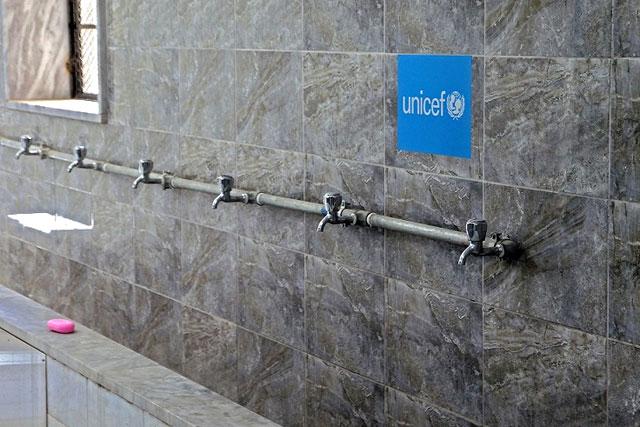You are here
MIRRA, UNICEF join hands to improve wastewater treatment, reuse
Sep 21,2020 - Last updated at Sep 21,2020
AMMAN — Being one of the driest countries in the world, Jordan faces many pressing environmental difficulties.
Water scarcity affects every aspect of Jordanian life and poses a great challenge to economic growth and development. Factors such as population growth, climate change, inefficient water use and weak governance of water supplies further worsen existing water problems by reducing water availability and depleting aquifers.
Due to these difficulties, Jordan has committed to addressing the Sustainable Development Goals (SDGs), notably SDG 6 (Access to water and sanitation for all) and SDG 13 (Urgent project to achieve combating climate change and its impacts).
However, much progress is needed, as 35-60 per cent of freshwater within the domestic sector is still wasted on purposes that do not require high water quality, such as irrigation and toilet flushing.
In order to resolve this discrepancy and advance towards a more sustainable future, it is crucial to take action and lower demands on the limited freshwater resources.
Methods for Irrigation and Agriculture (MIRRA), in partnership with and funding from UNICEF, launched and implemented an innovative programme to improve wastewater management and reuse at a decentralised level in three public schools in the Mafraq Governorate.
The initiative accomplished three specific objectives:
1) Implement new greywater and wastewater management systems in order to increase water savings and prevent groundwater pollution
2) Utilise solar power for the installed systems
3) Raise awareness among students and teachers on these sustainable efforts, as well as address and improve behaviours and practices regarding Water, Sanitation and Hygiene (WASH) services.
The project focused on three schools in Rihab village, located in Mafraq: Rihab Secondary School for Girls, Rihab Elementary School for Boys, and Abdullah Bin Al Zubair School for boys.
As one of Jordan’s largest victims of scarce water resources and rapid population growth, Rihab has been subject to a depletion of water resources and exacerbated levels of groundwater pollution. The district also had no sewer network coverage, relying on cesspits for wastewater disposal.
In order to tackle these issues, the project implemented high-quality WASH infrastructure that optimised sustainability, water quality, procurement processes and building materials and procedures.
This included installing, for each school, a greywater (wash sinks and drinking faucets) collection, treatment and reuse (in toilet flushing) system, a decentralised wastewater treatment plant (DWWTP) from toilet water, and a drip irrigation system for the reuse of treated wastewater; all entirely powered by solar energy.
Thus, water is efficiently reused for two purposes: Treated greywater reuse for toilet flushing in the first cycle and treated wastewater reuse for restricted irrigation in the second cycle. The combined systems successfully conserve about 5 m3 of freshwater every day, further alleviating the pressing challenge of freshwater scarcity.
Through accomplishing better sanitation infrastructure and water conservation, MIRRA’s implementation efforts fulfilled the goals set by the
UNICEF WASH programme and ameliorated the day-to-day lives of the local community.
While WASH infrastructure provided technological relief, it also helped to spread awareness and encourage best WASH behaviours and practices. Outreach sessions were conducted in order to inform students and the local community on decentralised wastewater management and to better prepare them for future environmental challenges. In order to ensure long-lasting effects of the implementations, MIRRA trained over 100 relevant staff and community members on usage of the installed systems through in-person training sessions.
Additionally, students at the targeted schools learned about the purpose of the project and the positive impacts of sustainability efforts.
These educational activities included creating paintings to illustrate the implemented systems’ design, as well as cleaning schoolyards and collaboratively planting more than 265 trees.
Students were also taught the significance of trees and wastewater reuse for environmental conservation in a classroom setting.
MIRRA provided on-site training workshops in order to showcase the operation of the automatic irrigation system and the process of treating greywater and wastewater.
These efforts can empower students to tackle environmental issues in the future, as indicated by a head teacher’s comment, “participating in the improvement of their schools will motivate the students to save water”.
Through the project “Decentralised Wastewater Treatment and Reuse in Institutions”, MIRRA, with support from UNICEF, successfully provided sustainable solutions to one of Jordan’s greatest obstacles — water scarcity.
By installing innovative technology and educating the local community through outreach efforts, MIRRA’s work improved Rihab residents’ quality of life and empowered them to make environment-friendly choices in the future.
Due to its incredible success, the programme is extended for one year under the title “Innovative Greywater Treatment WAK-GREY and Reuse Systems for Selected Jordanian Governmental Schools,” an effort that will expand the positive outcomes of this project to many more schools in Jordan.
(MIRRA contributed this article to The Jordan Times)
Related Articles
AMMAN — Methods for Irrigation and Agriculture (MIRRA) conducted a capacity building programme for 15 female engineers seeking employment in
AMMAN — From 2016 to 2019, the project “Ultra-Low Energy Drip Irrigation for MENA Countries”, implemented by Jordanian NGO, Methods fo
AMMAN — UNICEF has scaled up its water, sanitation and hygiene support to the Ministry of Education ahead of school reopening this week with

















